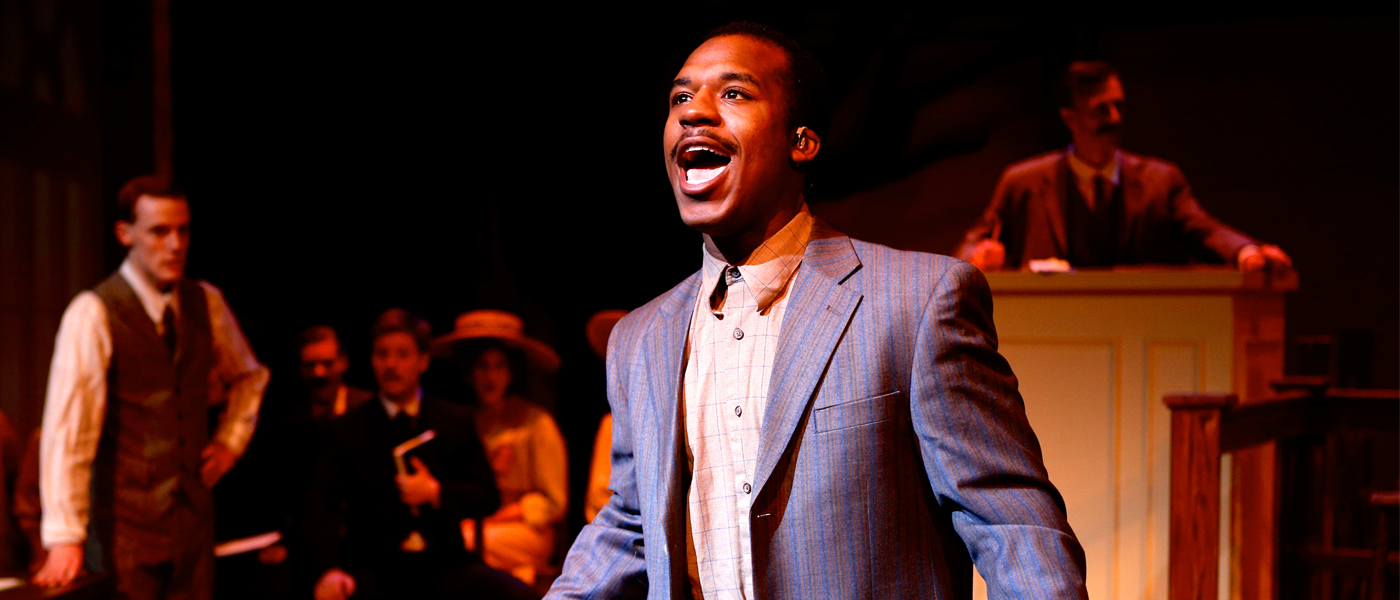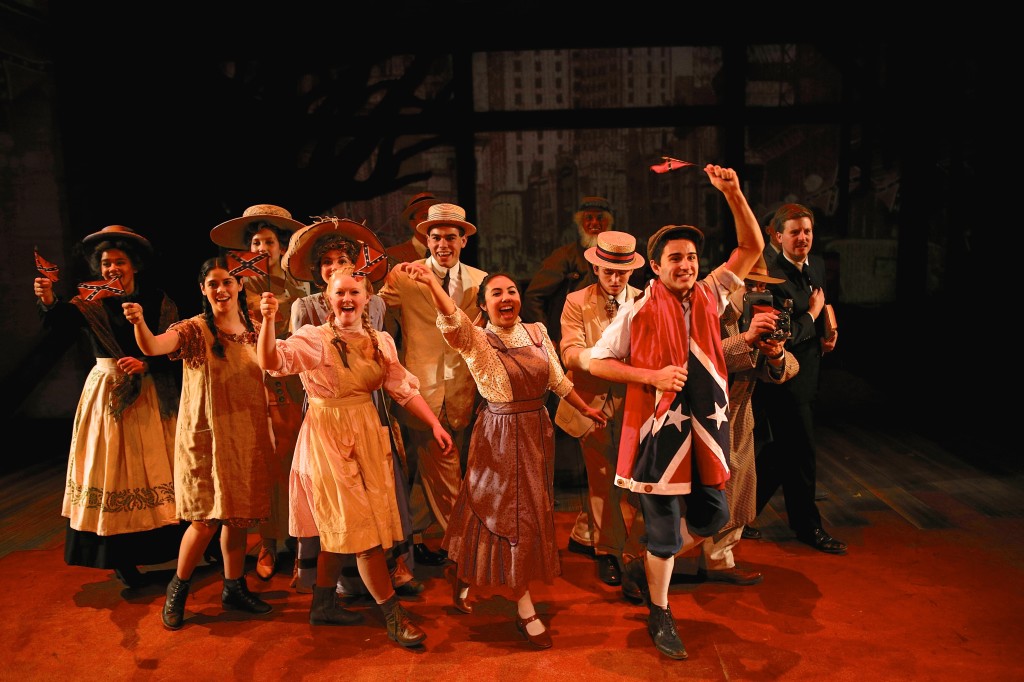Parade sounds like an unlikely title for a musical about a lynching. The title also carries two meanings for this season opener from the Syracuse University Drama Department.
Set in Atlanta in a hundred years ago, the action begins and concludes on two Confederate Memorial Days, featuring chest-thumping celebrations for the Lost Cause. On such days those not linked to the losing side in the Civil War, like Yankees, blacks and Jews, had to lay low. Secondly, the show feels like a pageant or even an epic, with 26 players taking on 46 roles.
With the steady stream of miscreants, blowhards and the occasional innocent, a massive contingent of players get their moments in the spotlight. Director Marie Kemp keeps them constantly in motion in the widest space, attaching what used to be the Storch Theater’s wings to the total length.
The excellent book by Alfred Uhry (Driving Miss Daisy) and a vibrant score by Jason Robert Brown (The Last Five Years) was not enough to extend Parade’s initial run of only 89 performances. The show’s subsequent popularity with university companies probably draws from the stirring theme, but the generous distribution of musical numbers allows SU Drama to display commanding reserves of talent.
The episode on which Parade is based might have been a century ago but it has not been forgotten, being the subject of 20 books and a memorable 1988 TV miniseries, The Murder of Mary Phagan. With the flimsiest of circumstantial evidence, the court charges pencil manufacturer Leo Frank (Ethan Saviet) with murdering 13-year-old employee Mary Phagan (Lisa Graye). Hailing from Brooklyn, Frank sprinkles his speech with Yiddish and is well-educated. As Uhry’s script neglects to say, he’s a Cornell graduate. Playing to nativist, class and ethnic hatred, the right-wing press, not unlike current AM talk radio, whips up a storm of vitriol. Scheming journalist Tom Watson (Reid Watson), the Nancy Grace of his day, demands a guilty verdict, and gets what he wants.
Key to the case for prosecutor Hugh Dorsey (Ezekiel Edmonds) is the testimony of one-time factory worker Jim Conley (Jerrod Everett), who claims knowledge of the crime in “That’s What He Said.” A powerless black man in a world of white supremacy, Brown and Uhry give him his own idiom, and it’s a masterpiece of ambiguity and insinuation. As Uhry’s script fingers Conley as the actual killer, Conley’s second-act reappearance in ”Feel the Rain Fall,” in convict stripes while serving on a chain gang, is one of the most riveting in the intense, two-hour, 45-minute production.
Leo’s wife Lucille (Ana Marcu) is no passive Southern belle. Virtually his only defender at the travesty of a trial, her heartfelt solo “You Don’t Know This Man” signals her resolve to do what she can: by gate-crashing the governor’s ball. All through the first act the marriage of Gov. Jack Slaton (Tyler Jimenez, the tallest member of the cast) and his wife Sally (Anna Wnukowski) have been paralleled with that of Leo (the shortest member) and Lucille. We almost expect them to meet.
Together with choreographer Andrea Leigh-Smith’s high-stepping gavotte, the ballroom scene is perhaps Kemp’s most dazzling staging. Both Slaton and Lucille are constantly in motion but never appear winded (an advantage of student actors) and turn their heads to project clearly to the audience. The nine players of the supporting symphony under music director Brian Cimmet flood the ballroom with sound but never drown out the words or the sentiment. It is in this light, ostensibly elegant moment that Lucille strikes the first blow on Leo’s behalf.
Slaton, a man of weak but real conscience, will do the right thing and commute Leo’s death sentence, even though he knows he will pay a price for it. Indeed, Slaton’s action signals a torrent of populist rage in “Where Will You Stand When the Flood Comes?” Leo has been removed to Milledgeville, but it is not far enough. In life the fury over the Phagan murder swelled the ranks of the Ku Klux Klan, and the rancor it engendered led to the founding of the Anti-Defamation League.
What a stroke of good fortune that Ethan Saviet should have been a senior when SU Drama opted for Parade. His singing is superb, especially in Leo’s final love duet with Lucille, “All the Wasted Time,” but his acting is stronger: the portrayal of a terrified innocent that is itself terrifying. Parade is a powerful, compelling show, almost like To Kill a Mockingbird as tragedy.
Parade continues with performances on Wednesday, Oct. 15, through Friday, Oct. 17, 8 p.m.; Saturday, Oct. 18, 2 and 8 p.m.; and Sunday, Oct. 19, 2 p.m., at the Syracuse Stage complex, 820 E. Genesee St. Call 443-3275 for details.
[fbcomments url="" width="100%" count="on"]










